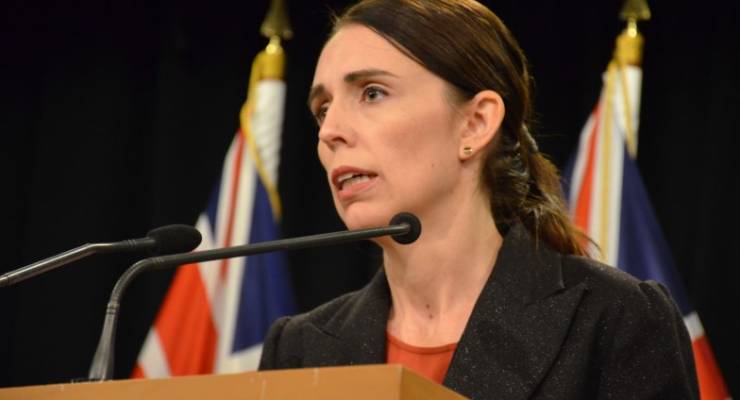
In some ways, it’s too easy to look longingly across the Tasman — New Zealand Prime Minister Jacinda Ardern is young and energetic, radiates a certain common touch and decency, and is a fine orator.
And while we’re not exposed to issues with the New Zealand government’s response to the COVID-19 crisis (such as problems facing its welfare system), it’s hard to deny that when it comes to containing the spread of the coronavirus, New Zealand has done a remarkable job.
As The Washington Post put it, it hasn’t flattened the curve so much as squashed it.
It is testing more and more people and finding fewer and fewer cases. With around 1200 cases, its medical system is nowhere near being overwhelmed, and has so far seen only a single death at time of writing.
Bernard Hickey, managing editor of Newsroom Pro, told Crikey that its partly a combination of “geography and history” that has so far seen New Zealand relatively spared.
“It got here late, and when it did we were able to respond hard, and respond fast,” he said.
On March 23, New Zealand went into a “level three” lockdown. At the same time the public were told they had 48 hours to prepare for “level four”: a nationwide shutdown of everything other than essential services, combined with strict restrictions on movement.
Professor Michael Baker from the Department of Public Health at the University of Otago told New Zealand’s AM Show it was the “most decisive and strongest lockdown in the world” and put New Zealand in with a chance of being the only Western nation to avoid the worst of the COVID-19 pandemic.
There is also a hint of unchecked executive power built into New Zealand’s political system, which has proved useful in fighting the virus.
“We don’t have a senate or the same jumble of powers between state and federal governments as Australia,” Hickey said.
“There’s no constitutional checks on what the PM can tell, say, the police to do. Essentially, when you’re elected prime minister, you’re elected to run the whole country for three years.”
Further, and in contrast to Australian Prime Minister Scott Morrison’s early performance, Ardern’s communication during the crisis has been widely praised.
Colin Peacock, host of Radio New Zealand’s Mediawatch said Ardern’s key message was the “bubble” — the idea of reducing the number of people one interacts with to “a small group of individuals who are part of your bubble … [a] bubble you must maintain” for the month of the lockdown.
“We all know it: ‘you mustn’t test the bubble, you mustn’t burst the bubble’. It seems a bit juvenile maybe, but it’s very clear,” he said.
“It’s the same with all the messaging, right down to the yellow and black branding and the slogans, ‘Unite against Covid 19’.”
Two days before the first lockdown came into effect, Ardern gave an address breaking down what the different levels of lockdown meant for the public.
And in the hours leading up to the imposition of the lockdown, citizens received a text message:
STAY HOME. Act as if you have COVID-19. This will save lives…. Where you stay tonight is where YOU MUST stay from now on. Let’s all do our bit to unite against COVID-19.
Of course, being popular and trusted helps.
“She has a way of communicating that is clear and compelling,” Hickey said.
“And she has good form on crises — most obviously in the aftermath of the March [2019] attacks in Christchurch, she was widely regarded as having responded really well. And she’s having a ‘good crisis’ so far this time.”
Hickey contrasted this with Morrison’s performance during the bush fires that afflicted Australia across the Christmas period.
“That, from here, didn’t look like a shining moment for Morrison,” he said.
While New Zealand’s draconian approach had attracted some modest push back, “it hasn’t got much traction”, Hickey said.
But it all could have been very different, Peacock said.
“We would have been found out if we hadn’t acted when we did,” he said. “New Zealand doesn’t have the state-federal breakdown, but it does have different regional health authorities called district health boards, who are elected every three years.”
If there had been a major outbreak, he said “there would have been a lot more criticism about our health system and how unevenly funded it is”.
People have followed the rules — mostly. Health Minister David Clark took his family a scenic drive and a walk during the first weekend of the lockdown.
He’s been chastised and demoted in cabinet rankings, but not fired from the health portfolio.








Shes got Gravitas
The NZ government also put in place a committee, chaired by the opposition, to oversee the government’s actions. This was announced at the same time as the lock-down was explained. The committee’s meetings are broadcast and streamed lived for anyone to watch, and has seen lively debate about the government’s response. Along with good communication, I think this perceived interest in oversight and accountability has contributed to public compliance.
Ardern is a heroine of our times!
Not that it will influence anything in Australia -unfortunately. See how the Murdoch press constantly tells us that Ardern is nothing much really. That is what counts in Australia. The Stokes press and TV are not much better, and by now the ABC has been completely infiltrated and cowed. That is what ensures continuing coalition governments in the years to come, and Labor have only themselves to blame for allowing this concentration of media ownership and the stacking of the ABC board by John Howard, which they never tried to dismantle.
New Zealand’s per capita infections are 40% higher than Queensland. Queensland is not an island. Ardern is not the messiah.
NZ has been a star, and Ardern looks like a world genius. Sure, some numpties in NZ are complaining, that’s what happens to a leader.
Morrison followed soon after.
Morrison is not a leader. He’s from Marketing!